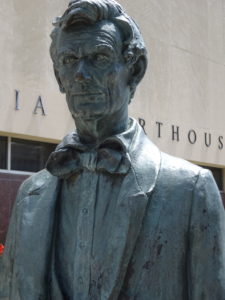 On October 18, 1854 Lincoln rose to the forefront of the Republicans with a speech he gave first in Springfield, and then a dozen days later in Peoria. Newspapers published the second presentation, so it came to be known as the Peoria speech. It began when Stephen A. Douglas, the originator of the Kansas-Nebraska policy, spoke to a large crowd at the state fair in Springfield. Lincoln was in the audience and proclaimed that he would respond to Douglas’s arguments, saying “Douglas lied; he lied three times and I’ll prove it!” That evening he did so at the Illinois state house. While Lincoln sat quietly listening to Douglas’s speech, Douglas repeatedly interrupted Lincoln.
On October 18, 1854 Lincoln rose to the forefront of the Republicans with a speech he gave first in Springfield, and then a dozen days later in Peoria. Newspapers published the second presentation, so it came to be known as the Peoria speech. It began when Stephen A. Douglas, the originator of the Kansas-Nebraska policy, spoke to a large crowd at the state fair in Springfield. Lincoln was in the audience and proclaimed that he would respond to Douglas’s arguments, saying “Douglas lied; he lied three times and I’ll prove it!” That evening he did so at the Illinois state house. While Lincoln sat quietly listening to Douglas’s speech, Douglas repeatedly interrupted Lincoln.
Lincoln vigorously condemned slavery. After giving a brief history of slavery in America, he forcefully denounced it. He reiterated his belief that slavery was morally and politically wrong, but also that the Constitution protected it in the areas where it already existed. Therefore, the federal government could not remove it from the South, but it could, and must, restrict its spread into the territories. The Kansas-Nebraska Act, he argued, violated those principles, and Douglas was contradicting himself with regard to his support for the Missouri Compromise, which the Act now voided. Lincoln made his views on the Kansas-Nebraska Act and slavery clear:
I cannot but hate. I hate it because of the monstrous injustice of slavery itself. I hate it because it deprives our republican example of its just influence in the world—enables the enemies of free institutions, with plausibility, to taunt us as hypocrites—causes the real friends of freedom to doubt our sincerity, and especially because it forces so many really good men amongst ourselves into an open war with the very principles of civil liberty—criticizing the Declaration of Independence, and insisting that there is no right principle of action but self-interest.
Lincoln further argued that slaves and free blacks were men, and as such had the same right to self-governance that white men did. Quoting from the Declaration of Independence, Lincoln asserted that the phrase “all men are created equal” included black men as well as white, and that “no man is good enough to govern another man, without that other’s consent.”
These were progressive words in 1854. Being anti-slavery in the North did not necessarily signify belief in equality between the races. Lincoln recognized that even if all slaves were free, society would not function given inherent inequalities, attitudes, and bigotries. Overlooking the fact that most slaves at this time had been born in America, he favored colonization as a means for free blacks to leave the United States and set up black-led countries of their own. Despite this inconsistency, by forcefully arguing for the moral wrong of slavery and the dangers of slavery spreading because of the Kansas-Nebraska Act, Lincoln set the framework for a slavery debate that lasted the rest of the decade.
And thus, like the shot fired in Concord, Massachusetts on April 18, 1775 that started the Revolutionary War, Lincoln’s Peoria speech on October 16, 1854 began the intense debate on slavery that would lead to the Civil War. Peoria was indeed, the speech ’round the world.
[Adapted from Lincoln: The Man Who Saved America]
David J. Kent is an avid science traveler and the author of Lincoln: The Man Who Saved America, in Barnes and Noble stores now. His previous books include Tesla: The Wizard of Electricity and Edison: The Inventor of the Modern World and two specialty e-books: Nikola Tesla: Renewable Energy Ahead of Its Time and Abraham Lincoln and Nikola Tesla: Connected by Fate.
Check out my Goodreads author page. While you’re at it, “Like” my Facebook author page for more updates!










